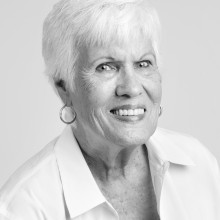
Bettye Anding
Way back when Lambeth House — the posh retirement home for seniors on the crescent of the river in Uptown New Orleans — was practically new, a former editor of mine and his wife moved there. They made a festive occasion of it, inviting friends to tour their new premises, a two-bedroom suite with a large living room and small kitchen, and a balcony overlooking the trees fringing the Mississippi just beyond.
My husband and I were among the first to join them in sampling the cuisine in the facility’s restaurant, where every meal was preceded by the presentation of a menu giving them a choice of dishes to enjoy.
I can’t remember all the amenities available downstairs, but there were places to exercise, rooms in which to watch television and sometimes movies or listen to music, and others in which groups held meetings and speakers were often invited to talk about cultural matters or events of current interest.
At that time, years ago, I was too young to realize that as luxurious as their new home was, as carefree as their new lifestyle would be, it must have been a wrenching decision to move there.
They had to admit to themselves that they were becoming fragile — he in ill health in his 80s and she in her 70s — and no longer fully capable of something most of us take for granted: the ability to live independently. They had to face the fact that they were on the last lap of the track, nearing the finish line.
I got to thinking about all this while my husband talked on the phone with a dear friend of almost 60 years, a widower who’ll soon be selling his pretty condo in Chattanooga and moving to nearby Georgia, in with his son and his family.
When his youngsters built their home, a large suite was included for their oldest, college-age daughter, on a separate floor from their own quarters and those of their littlest children. It was planned then that one day grandpa would take residence there, and the time has now come; he’s 87 and she will be getting married in October and leaving the family home.
It’s a step that surprises me, though: It has been a long time since Americans lived like The Waltons, with elderly grandparents and two generations of their descendants sharing the same house.
And our friend will be leaving his neighborhood — friends, church, bridge club, gym, and shops and stores he has grown familiar with for almost 20 years — socializations he holds dear.
Back in the Waltons’ time, it wouldn’t have been that way. Most Americans stayed put, living in the same communities their forebears helped form, building houses across the road or street from aunts, uncles, cousins. If grandma and grandpa lived alone, there was always company and assistance down the street.
Since leaving college, our buddy has lived in four different cities and towns and fitted himself firmly within the life of each. He’s a joiner and a doer and a socializer and — most important — a good friend.
He dearly loves the son, daughter-in-law, teenaged twin grandsons, and little granddaughter he’ll now be living with. He can cope; he’ll be fine.
And his problems are small — aren’t they? — compared with those of elderly folks who must move across the country to be with kin, those whose options aren’t nearly as attractive, those who have no one.
But all have this one thing in common: they’re dealing with the fact that — as in the riddle of The Great Sphinx — they’re now walking on three legs.
Bettye Anding is a former editor of the Living section of The Times Picayune, for which she wrote “Silver Threads” until her retirement. Email comments to her at btanding@cox.net.
 NOLAbeings Multimedia artist Claire Bangser created NOLAbeings as a portrait-based story project that marries...
NOLAbeings Multimedia artist Claire Bangser created NOLAbeings as a portrait-based story project that marries...  Voodoo in New Orleans: Reviving history: New Orleans fortune telling This article takes a deep dive into the history of Voodoo in New Orleans, its hybridization with Catholicism, and its present-day place in the city's culture. The author visits fortune-tellers in the French Quarter, using their guidance as a tool for introspection rather than a deterministic predictor of the future. Through her experiences in New Orleans, the author feels a mystical connection to both the past and the future.
Voodoo in New Orleans: Reviving history: New Orleans fortune telling This article takes a deep dive into the history of Voodoo in New Orleans, its hybridization with Catholicism, and its present-day place in the city's culture. The author visits fortune-tellers in the French Quarter, using their guidance as a tool for introspection rather than a deterministic predictor of the future. Through her experiences in New Orleans, the author feels a mystical connection to both the past and the future. 